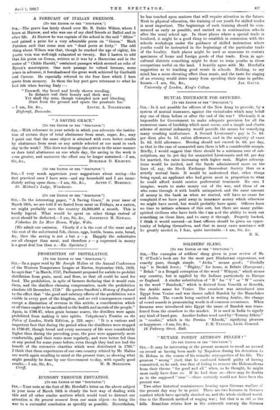MUTUAL INSURANCE FOR OFFICERS.
[TO THE EDITOR OF TRH SPECTATOR.1 Sia,—Is it not possible for officers of the New Army to provide, by a system of mutual insurance, against the vicissitudes which may befall any one of them before or after the end of the war ? Obviously it is impossible for Government to make adequate provision for all the numerous cases of hardship which must occur, and a simple and elastic scheme of mutual indemnity would provide the means for remedying many crushing misfortunes. A Second Lieutenant's pay is 7s. 6d. per diem pies ls. Id. ration allowance, and in tho majority of cases 2s. 6d. field allowance. Messing should not exceed 33. 6d. per day, so that in the case of unmarried men there is left a considerable margin. Briefly, I would suggest that there should be a minimum rate of sub- scriptions, say Is. per day for unmarried Lieutenants and 6d. per day for married, the rates increasing with higher rank. Higher subscrip- tions would be invited, and the funds administered more on the lines of, say, the Stock Exchange Benevolent Society than on a strictly mutual basis. It would be understood that, other things being equal, an applicant who had given most in proportion to what he could afford would receive preferential treatment No ono, I imagine, wants to make money out of the war, and those of us who come through it with health unimpaired, and the same amount of money in the bank as when we started, will have no cause for complaint if we have paid away in insurance money which otherwise we might have saved, but would probably have spent. Officers have no time to initiate schemes of this sort, but there are many public- spirited civilians who have both the tme a-id the ability to work out something on these lines, and to carry it through. Properly backed, I think it would succeed—at least officers should be given an oppor- tunity of helping themselves, and that in many cases assistanee will be greatly needed is, I fear, quite inevitable.---I am, Sir, &c.
N. K.






























 Previous page
Previous page